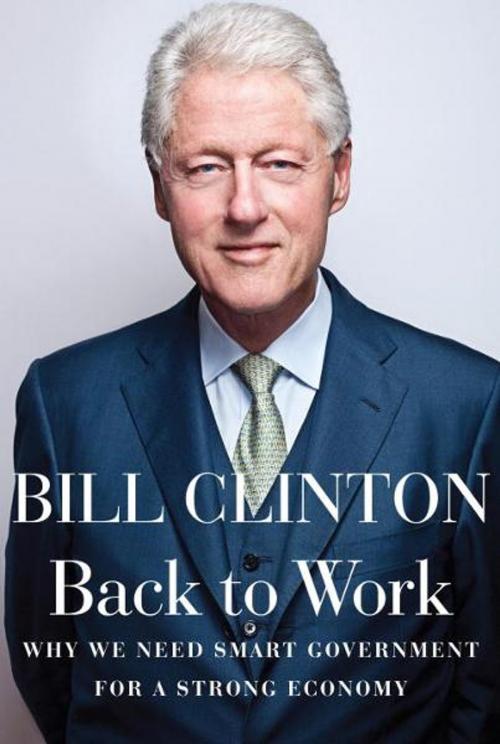Back to Work
Why We Need Smart Government for a Strong Economy
Nonfiction, Social & Cultural Studies, Political Science, Government, Public Affairs & Administration, Business & Finance, Business Reference, Government & Business| Author: | Bill Clinton | ISBN: | 9780307959768 |
| Publisher: | Knopf Doubleday Publishing Group | Publication: | November 8, 2011 |
| Imprint: | Knopf | Language: | English |
| Author: | Bill Clinton |
| ISBN: | 9780307959768 |
| Publisher: | Knopf Doubleday Publishing Group |
| Publication: | November 8, 2011 |
| Imprint: | Knopf |
| Language: | English |
“I wrote this book because I love my country and I'm concerned about our future,” writes Bill Clinton. “As I often said when I first ran for President in 1992, America at its core is an idea—the idea that no matter who you are or where you're from, if you work hard and play by the rules, you'll have the freedom and opportunity to pursue your own dreams and leave your kids a country where they can chase theirs.”
In Back to Work, Clinton details how we can get out of the current economic crisis and lay a foundation for long-term prosperity. He offers specific recommendations on how we can put people back to work and create new businesses, increase bank lending and corporate investment, double our exports, and restore our manufacturing base. He supports President Obama’s emphasis on green technology, saying that change in the way we produce and consume energy is the strategy most likely to spark a fast-growing economy and enhance our national security.
Clinton also says that we need both a strong economy and a smart government working together to restore prosperity and progress. He demonstrates that whenever we’ve given in to the temptation to blame government for our problems, we’ve lost our commitment to shared prosperity, balanced growth, financial responsibility, and investment in the future. That has led our nation into trouble because there are some things we have to do together. For example, he says, “Our ability to compete in the twenty-first century is dependent on our willingness to invest in infrastructure: we need faster broadband, a state-of-the-art national electrical grid, modernized water and sewer systems, and the best airports, trains, roads, and bridges.
“There is no evidence that we can succeed in the twenty-first century with an antigovernment strategy,” writes Clinton, “with a philosophy grounded in ‘You’re on your own’ rather than ‘We’re all in this together.’” Clinton believes that conflict between government and the private sector has proved to be remarkably good politics, but it has produced bad policies, giving us a weak economy with few jobs, growing income inequality and poverty, and a decline in our competitive position. In the real world, cooperation works much better than conflict, and “we need victories in the real world.”
“I wrote this book because I love my country and I'm concerned about our future,” writes Bill Clinton. “As I often said when I first ran for President in 1992, America at its core is an idea—the idea that no matter who you are or where you're from, if you work hard and play by the rules, you'll have the freedom and opportunity to pursue your own dreams and leave your kids a country where they can chase theirs.”
In Back to Work, Clinton details how we can get out of the current economic crisis and lay a foundation for long-term prosperity. He offers specific recommendations on how we can put people back to work and create new businesses, increase bank lending and corporate investment, double our exports, and restore our manufacturing base. He supports President Obama’s emphasis on green technology, saying that change in the way we produce and consume energy is the strategy most likely to spark a fast-growing economy and enhance our national security.
Clinton also says that we need both a strong economy and a smart government working together to restore prosperity and progress. He demonstrates that whenever we’ve given in to the temptation to blame government for our problems, we’ve lost our commitment to shared prosperity, balanced growth, financial responsibility, and investment in the future. That has led our nation into trouble because there are some things we have to do together. For example, he says, “Our ability to compete in the twenty-first century is dependent on our willingness to invest in infrastructure: we need faster broadband, a state-of-the-art national electrical grid, modernized water and sewer systems, and the best airports, trains, roads, and bridges.
“There is no evidence that we can succeed in the twenty-first century with an antigovernment strategy,” writes Clinton, “with a philosophy grounded in ‘You’re on your own’ rather than ‘We’re all in this together.’” Clinton believes that conflict between government and the private sector has proved to be remarkably good politics, but it has produced bad policies, giving us a weak economy with few jobs, growing income inequality and poverty, and a decline in our competitive position. In the real world, cooperation works much better than conflict, and “we need victories in the real world.”















